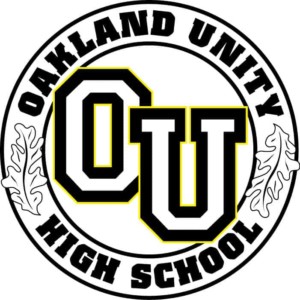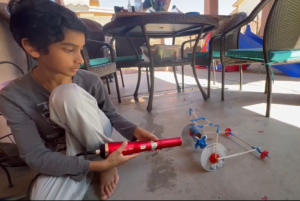Next Generation Online Learning Programs – Khan World School
Key Points
-
Khan World School launched in August 2022 to build a more engaging and challenging middle and high school virtual experience.
-
As a partnership between ASU Prep and Sal Khan, the learning model design includes mastery-based learning, seminars, concurrent-enrollment opportunities and tutorials in addition to online courses.

Online learning opportunities have increased exponentially over the last two decades, with massive acceleration during the pandemic. While these efforts have increased options, flexibility and access for many students, most efforts have translated traditional classroom practices – rigid time frames, learn/quiz/test formats, lower orders of thinking (memorization, etc.). Course delivery organizations have struggled to get the results that students deserve.
Khan World School launched in August 2022 to build a more engaging and challenging middle and high school virtual experience. As a partnership between ASU Prep and Sal Khan, the learning model design includes mastery-based learning, seminars, concurrent-enrollment opportunities and tutorials in addition to online courses. The combination of asynchronous independent learning with frequent synchronous human touchpoints increases connection and accountability into the learning experience.
Mastery-based learning
Most online learning platforms offer course-based and time-delimited structures. Deadlines and pace are closely controlled. Khan Academy offers the opposite – an asynchronous independent learning experience based on topical mastery. At Khan World School, Khan Academy courses are combined with ASU Prep Digital courses to create a rich academic asynchronous experience. Students can move at their own pace throughout the week and continually reinforce their learning through both ASU and Khan Academy resources. Each course outlines how to demonstrate mastery. Khan World School uses a modified grade scale that includes “In-Progress, B, or A.” These performance levels are based on student proficiency around course outcomes. Students must reach proficiency in order to receive credit for individual assessments and for the course as a whole. This ensures that students learn the required concepts and skills.
Seminar approach
Many topics in high school, conditioned and controlled by standards, stay away from the important and weighty challenges that face modern society. Yet, skills to build knowledge, take a stand, and discuss eloquently are transferable competencies needed more than ever in the United States and globally. Every student needs to understand data, build evidence, debate topics and form a well-informed opinion. Khan World School addresses this through weekly synchronous Socratic seminars.
Socratic seminars are small groups of students who gather online with “guides” to better understand challenging current issues. The seminar topics, designed by Stephen Levitt’s research team at the RISC at University of Chicago, such as “Should Social Media be Censored?”, “Is the World Getting Better?” and “What Does it Mean to “Live a Good Life?” drive discussion. However, discussion only happens after students read a number of original source documents on the subject. This avoids the trap of high enthusiasm but not well-informed discussions that often occur in schools.
One KWS student states, ““There has never been this much participation in my live lessons [before].” While another reports, “I had so much fun during the KWS Seminar discussions. I’ve never experienced such a platform before.”
Tutorials
Student learning is also reinforced through Tutorials – small groups of 3-4 students working with expert teachers each week in real time. Tutorials are held weekly in math, science, reading/writing and history with a different coach for each topic area. This approach mimics the efforts across the country to increase tutoring access for all students which has known benefits on student outcomes.
Concurrent enrollment
Because Khan World School is a collaboration with ASU Prep, students have access to a wide variety of concurrent-enrollment opportunities to help reach the network goal of every student graduating high school with at least 12 college credits – with the option of taking up to 12 college credits per year should they choose. Some students have enrolled in ASU courses as 9th-grade students to get a start on a college pathway.
Team model
Guides support all aspects of a student’s academic life through mentorship, seminar facilitation, and advisory, while Mentors work with students in subject-specific content. The Learning Facilitators support student success in the online asynchronous portion of the program offered through ASU Prep Digital (the network’s virtual charter school). The division of expertise and skills creates a stronger experience for students and a more balanced and focused experience for teachers.
Next generation online learning models
As the learning ecosystem becomes increasingly unbundled, new models of online learning are needed that maintain the flexibility offered by online programs but increase the engagement. In addition to Khan World School, other programs have emerged. Sora Schools is a new project-based and mastery-based online learning private middle and high school. My Tech High allows students in K-12 to design and bundle multiple learning experiences within a free, online, public model. StepMojo aggregates a variety of online providers for middle and high school students and combines the experience with three days a week of online expert instruction. Dallas ISD’s Dallas Hybrid Prep school is supported by Stemuli – a metaverse-based online program and independent mastery programs. All of these options are rethinking the traditional online learning model to improve outcomes and engagement.
The future of Khan World School includes the addition of middle school (beginning next year), growth of the high school model, and exploration of options embedded in school districts. As part of the larger ASU Prep microschool initiative to increase access and choices for learners, an on-site model might include in-person seminars and advisory supported by online concurrent enrollment and coursework. Local or remote Khan World School guides would facilitate the on-site model.







Nicky Broxis
I'm following Khan World School with huge interest. As an educator myself, I'm a huge fan of Mastery learning and self pacing and am so excited about this new offering. We are based in Cape Town and the time differences are a big issue for us and a significant barrier to signing up for US based programs. Are you aware of any European / closer time zone programs that could work for us please or have any suggestions to bright, self motivated kids who would thrive under a Khan World School type program? Many thanks